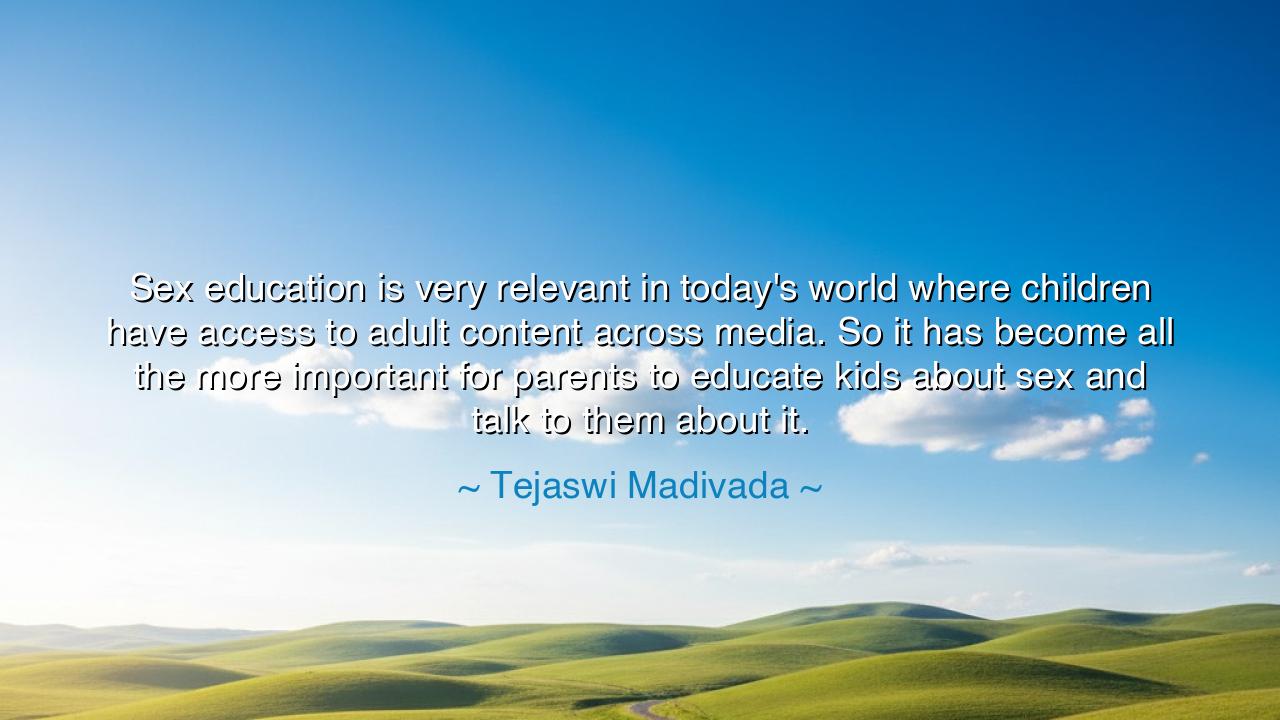
Sex education is very relevant in today's world where children
Sex education is very relevant in today's world where children have access to adult content across media. So it has become all the more important for parents to educate kids about sex and talk to them about it.






The actress and educator Tejaswi Madivada once said: “Sex education is very relevant in today's world where children have access to adult content across media. So it has become all the more important for parents to educate kids about sex and talk to them about it.” In these words, there is both wisdom and urgency. She speaks not as a moral judge but as a guardian of innocence, recognizing a truth many fear to face: that silence in the age of exposure is more dangerous than speech. The ancient sages said that light dispels darkness; in the same way, honest education dispels ignorance, confusion, and shame. What Madivada calls for is not corruption of childhood, but its protection — not indulgence, but understanding.
In earlier times, societies believed that certain topics were taboo, best left unspoken. But in the modern age, children have access to everything — both truth and distortion — through screens that know no boundaries. The world has changed; knowledge flows freely, but wisdom often lags behind. When Madivada speaks of “the importance of parents to educate kids about sex and talk to them about it,” she is calling upon families to reclaim the sacred duty of guidance. For if the parent does not teach with love, the world will teach with cruelty. If wisdom is not given by the heart, falsehood will enter through curiosity. Education, in this sense, becomes not a lesson of anatomy, but a lesson of respect, consent, and purity of thought.
The ancients understood the power of knowledge over instinct. In the temples of Greece and India, teachings about life and creation were part of spiritual education, not sources of shame. They believed that ignorance of natural truths led to superstition, and superstition led to fear. Likewise, Madivada’s message is deeply moral — that knowledge humanizes desire, while ignorance animalizes it. To teach a child openly and wisely about the body is to teach them reverence for life, responsibility for their actions, and compassion for others. To leave them uneducated is to let them wander in a forest of illusions, guided by impulses they do not understand.
History too offers us lessons born of silence. In many societies where sex education was forbidden, generations suffered from disease, exploitation, and abuse born of ignorance. One might recall the early years of the HIV epidemic, when silence and stigma spread faster than the disease itself. Only when educators, parents, and leaders began to speak openly — to replace fear with fact — did hope begin to return. In that era, it became clear that truth saves lives, while taboo endangers them. Madivada’s words continue this legacy of courage: to speak where others remain silent, to teach where others turn away.
But her quote also carries a deeper call — for parents to become participants, not bystanders, in the moral education of their children. Many parents believe silence equals protection, but silence is an illusion. To talk about sex does not corrupt the young; it prepares them. To remain silent does not preserve innocence; it leaves it defenseless. Madivada urges us to build trust between parent and child, where questions are not feared, and answers are given with honesty and grace. Such conversations do not destroy childhood; they safeguard it from a world that profits from confusion and secrecy.
This wisdom is as ancient as it is modern. In every civilization that endured, education of the young was not left to chance. The wise did not hide truth behind closed doors; they revealed it slowly, with reverence and context, teaching that life’s sacred energies must serve creation, not destruction. In this spirit, sex education becomes not a worldly indulgence, but a spiritual duty — the teaching of responsibility, empathy, and self-respect. It tells the child: your body is not shameful, your curiosity is not sinful, but your choices carry the weight of life itself.
The lesson of Tejaswi Madivada’s quote is clear and powerful. The age of ignorance is over; this is the age of awareness. To teach is not to corrupt, but to illuminate. The wise parent and the thoughtful teacher must walk ahead of curiosity, not behind it. They must bring truth before deceit finds the child first. When education replaces fear, the young grow not into rebels, but into responsible human beings — free, informed, and compassionate.
So let this teaching be passed on to all who raise the next generation: do not fear the truth, for the truth protects. Speak before the world speaks, guide before confusion misleads, and teach not with embarrassment but with love. For in the end, it is not the knowledge of sex that harms the child — it is the ignorance of it. And only through education born of courage and care can innocence be preserved, not destroyed.






AAdministratorAdministrator
Welcome, honored guests. Please leave a comment, we will respond soon